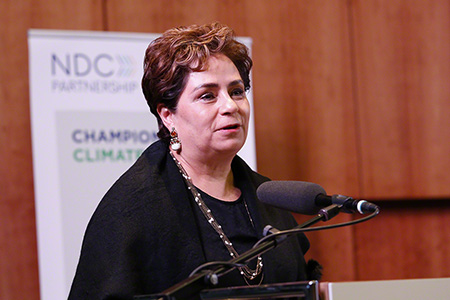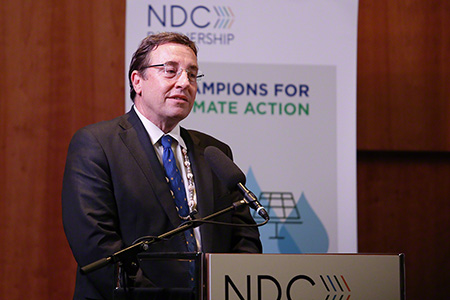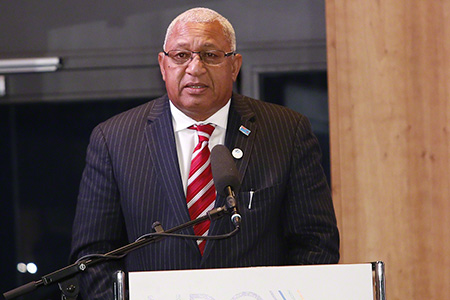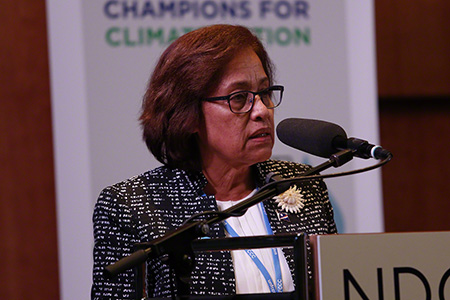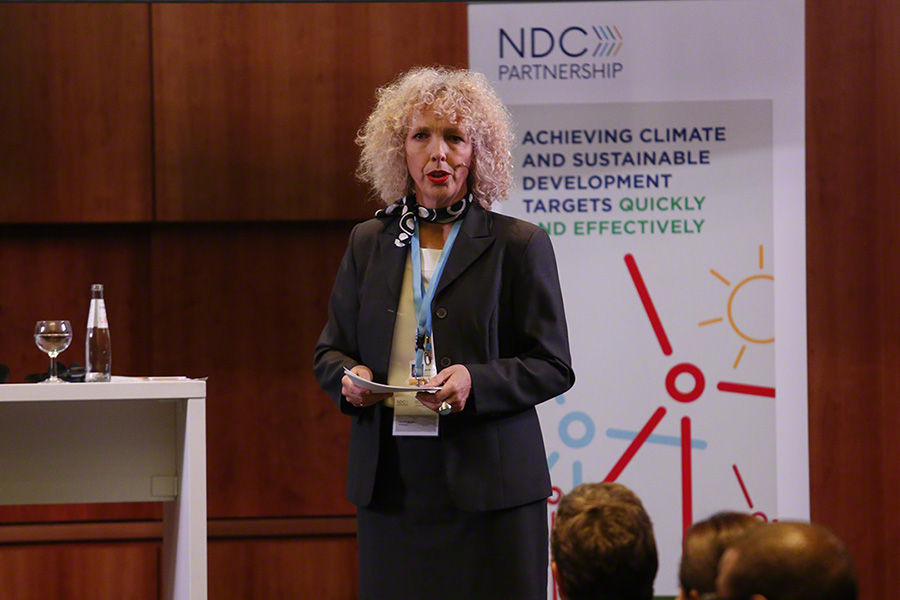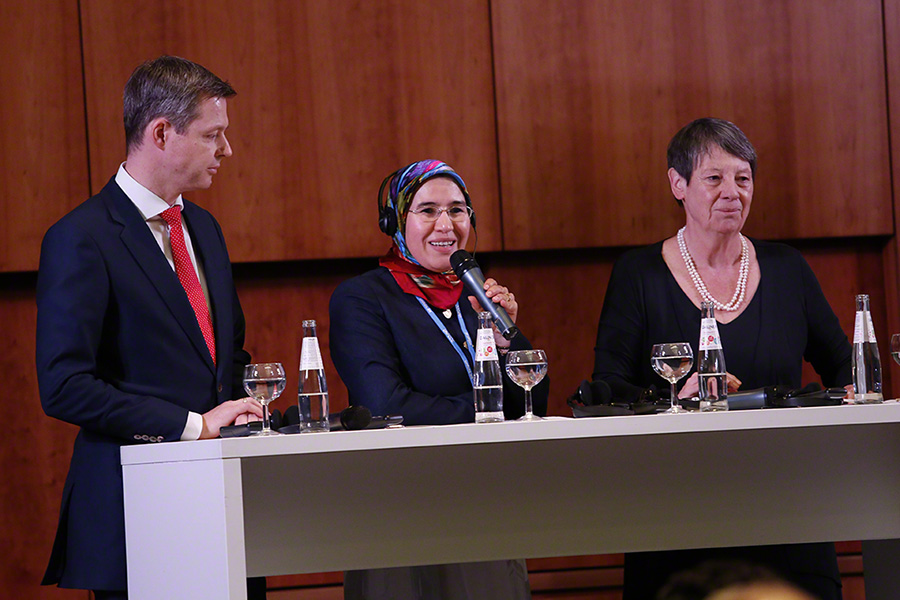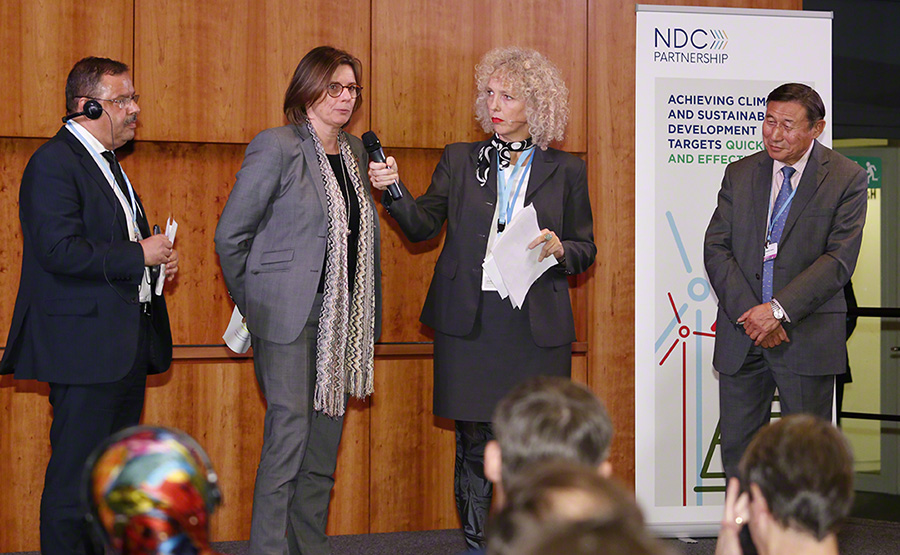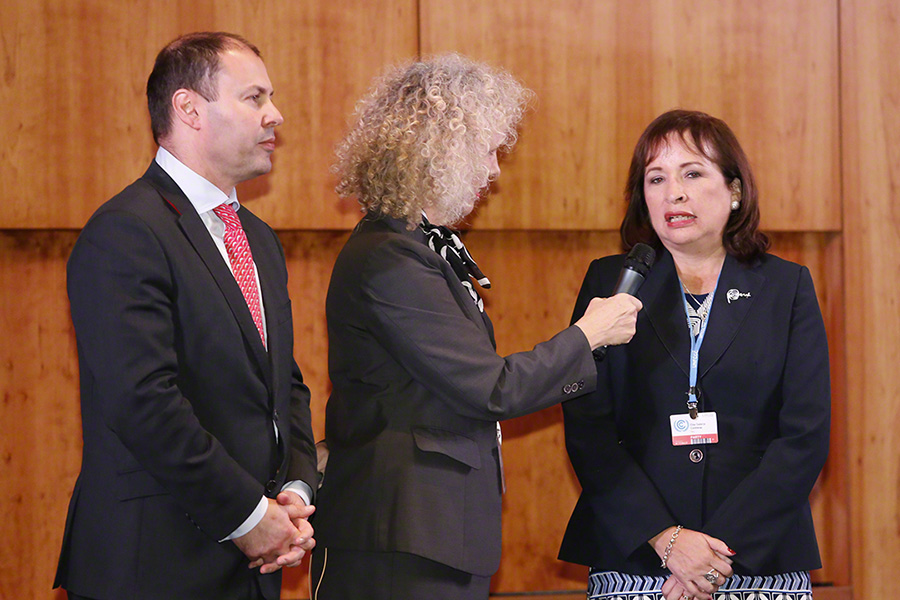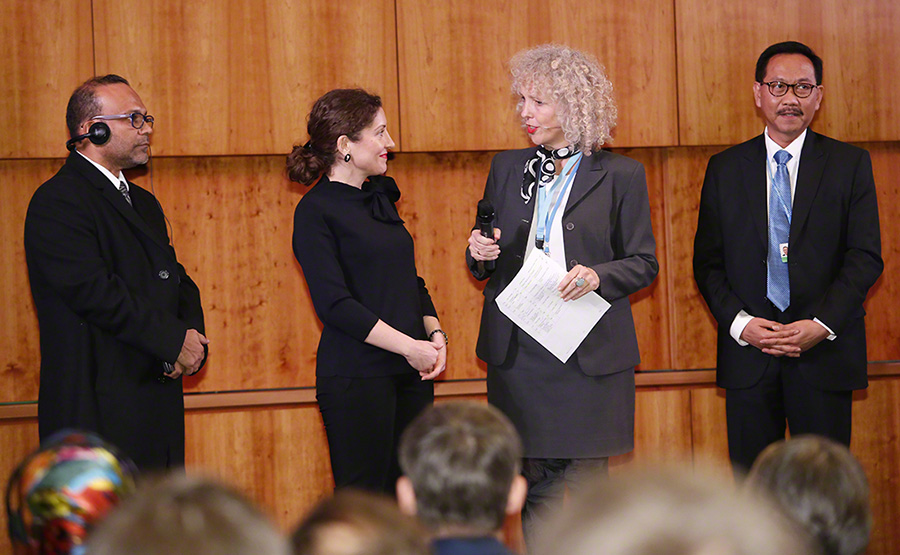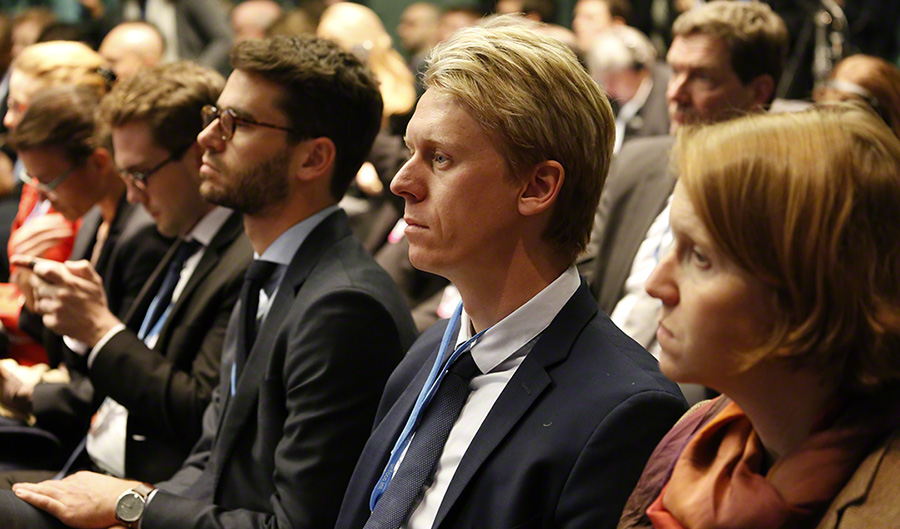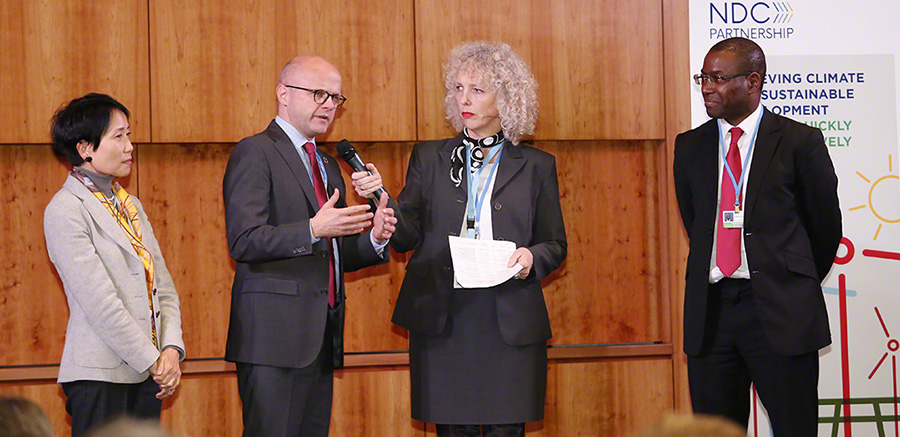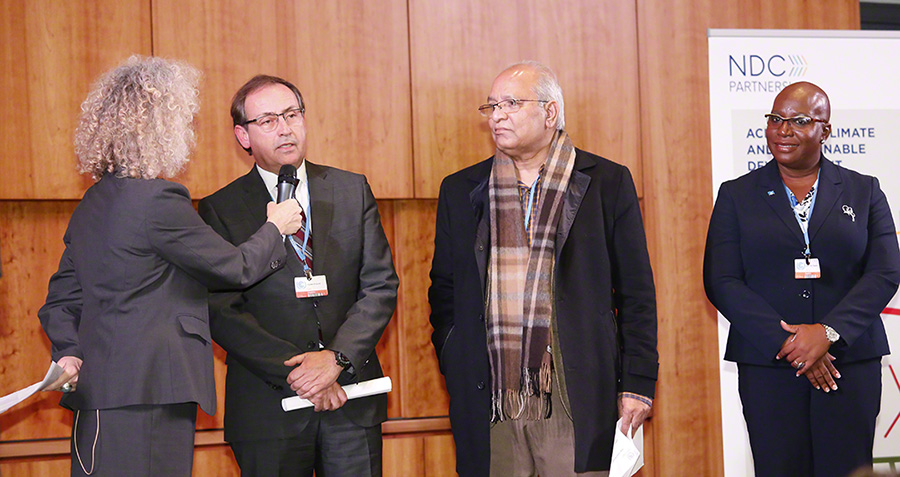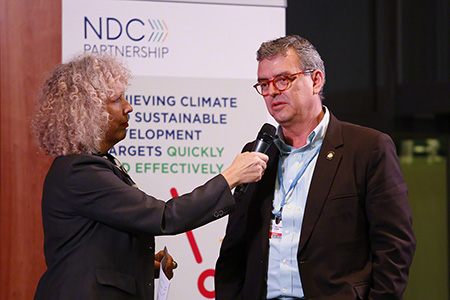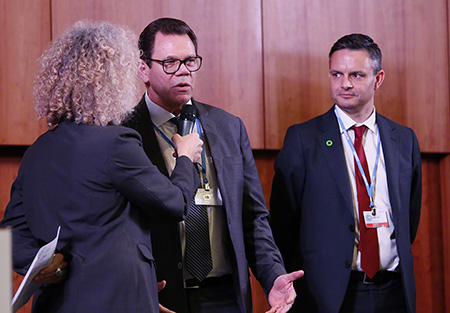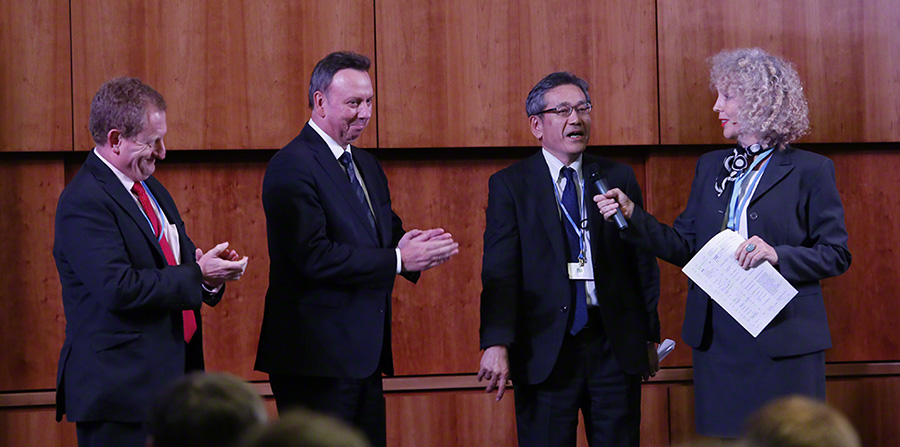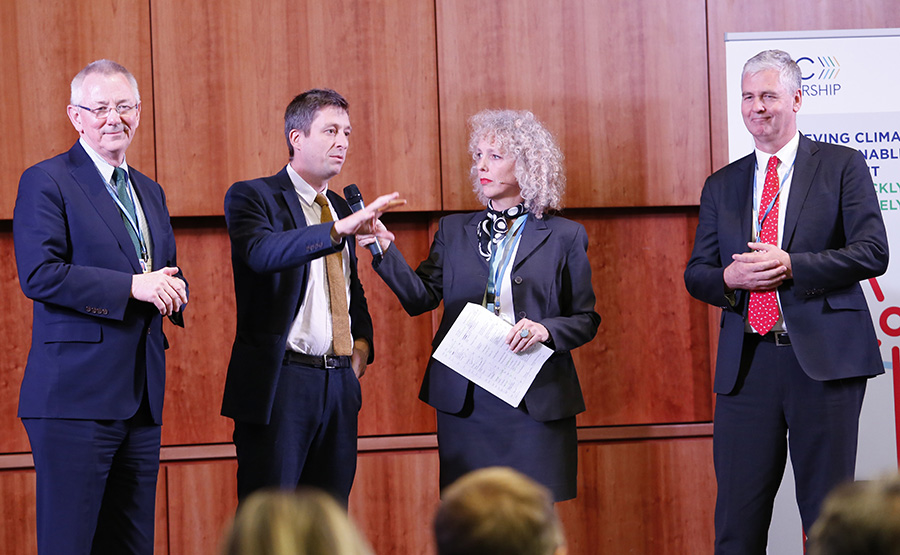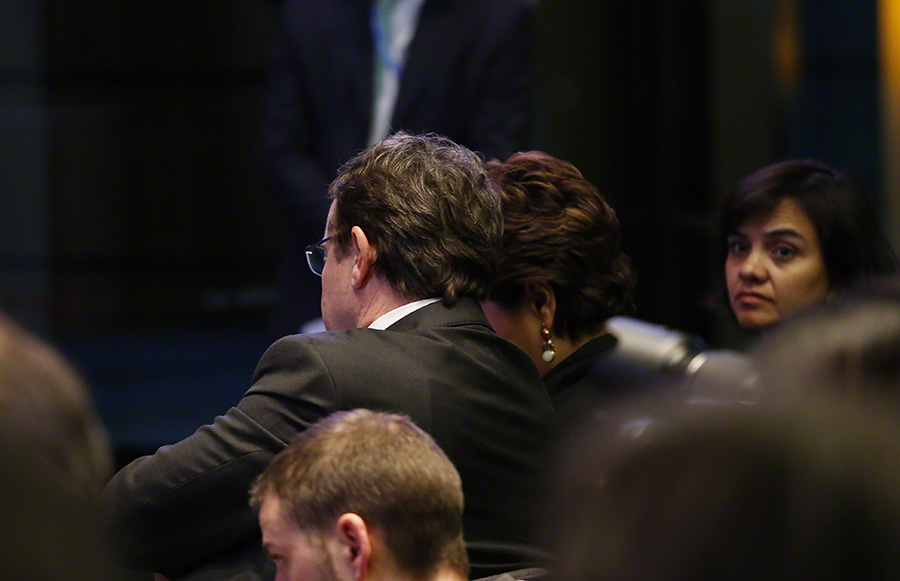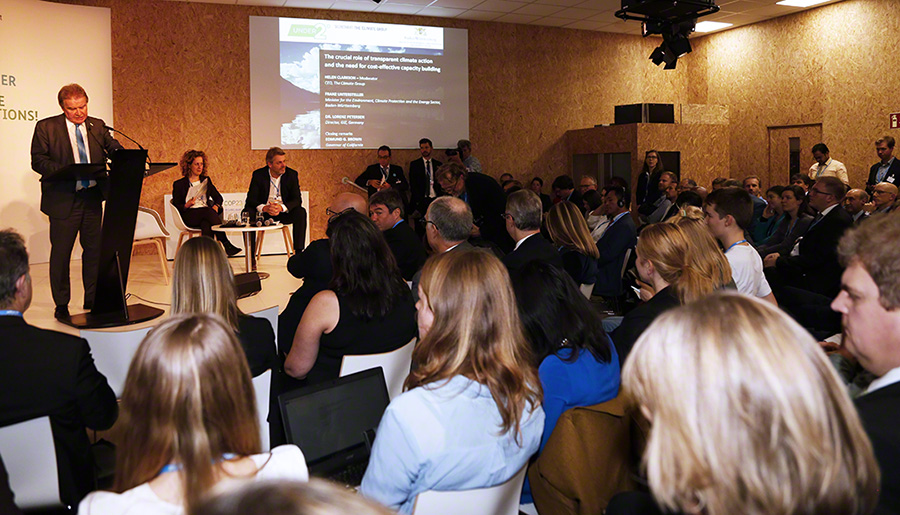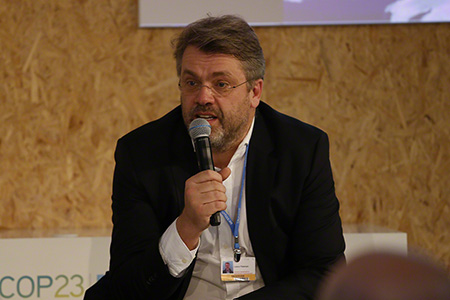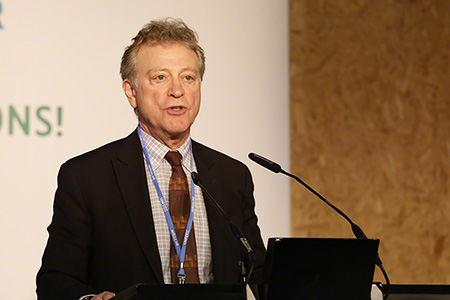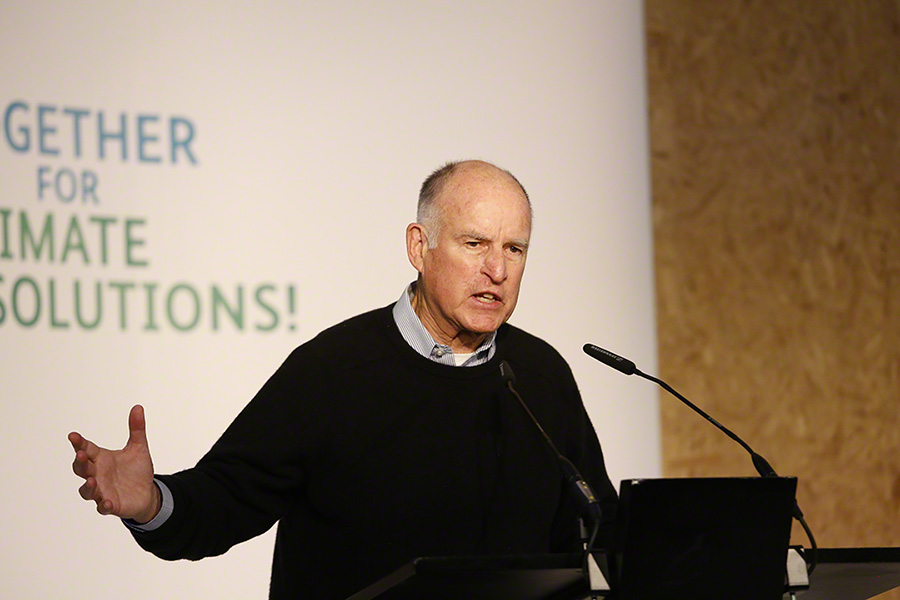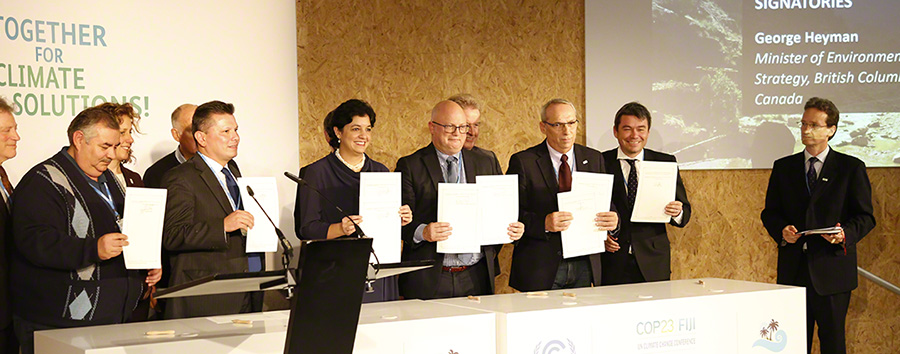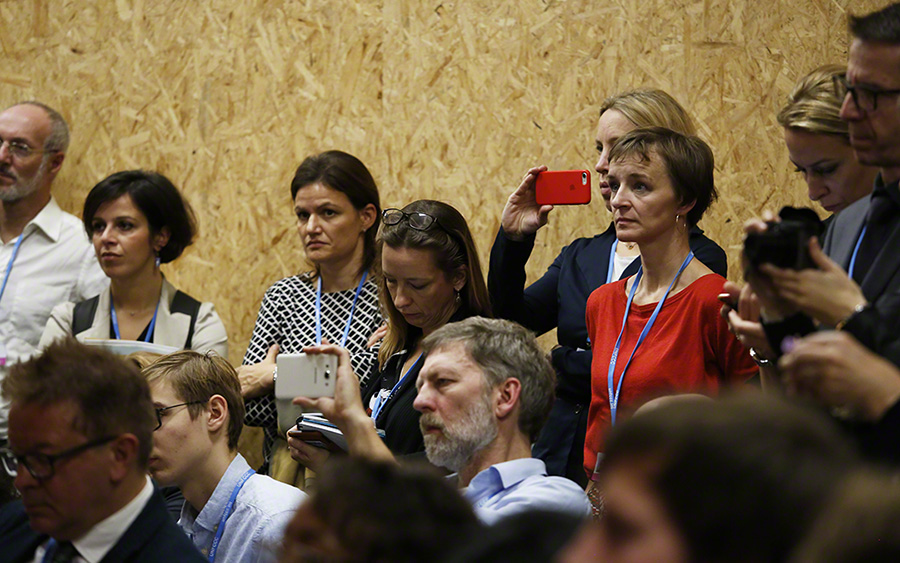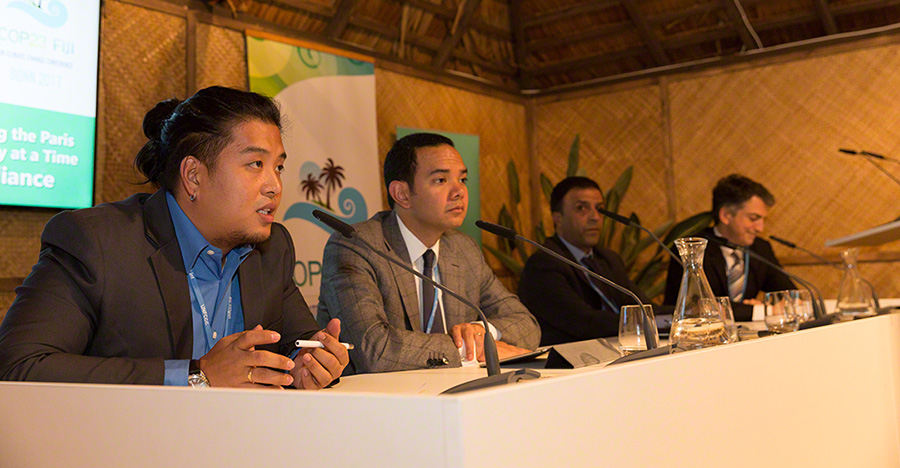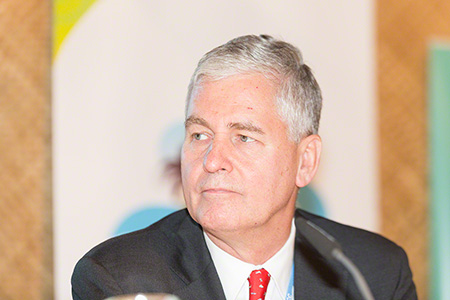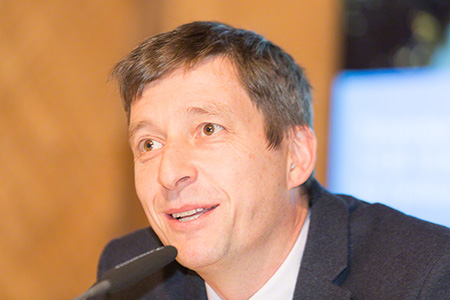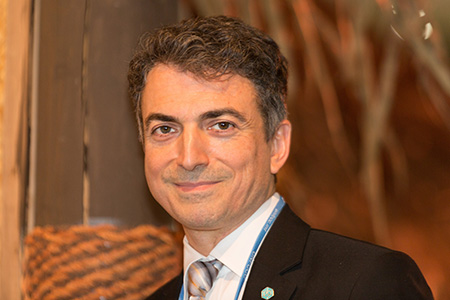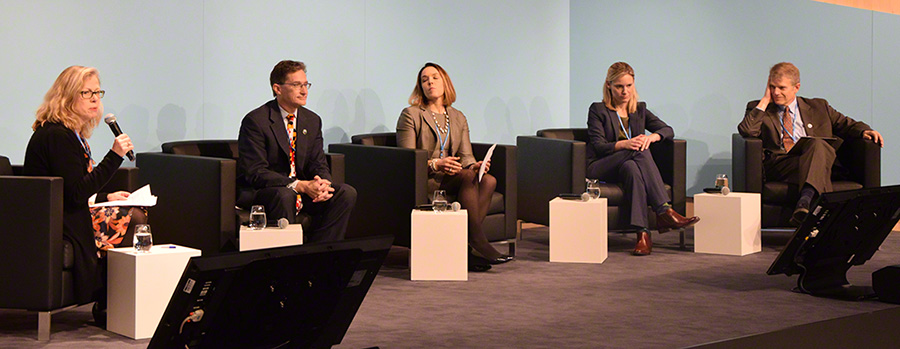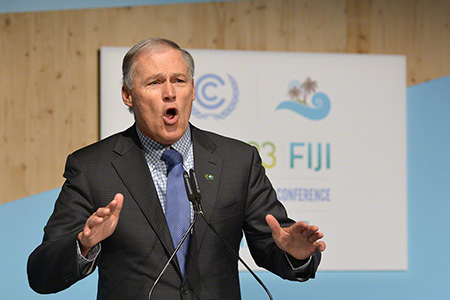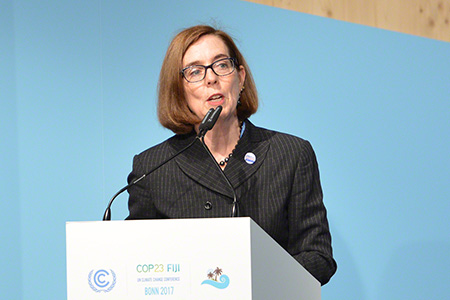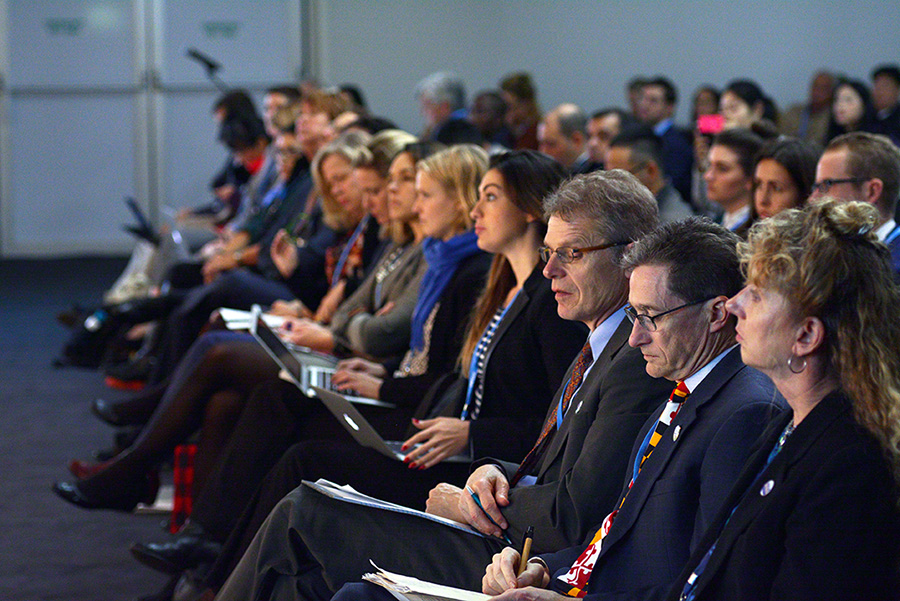Summary
The following events were covered by IISD Reporting Services on Tuesday, 14 November 2017:
- Champions for Climate Action
- The Under2Coalition: Taking Full Advantage of Mitigation Opportunities by Improving Measurement and Disclosure
- Leadership in Achieving the Paris Agreement One Country at a Time
- Climate and Clean Energy Policy in the US: State Leaders Speak Out
IISD Reporting Services, through its Earth Negotiations Bulletin on the Side (ENBOTS) Meeting Coverage, will provide daily web coverage from selected side events at the UN Climate Change Conference - November 2017.
Photos by IISD/ENB | Ángeles Estrada
For photo reprint permissions, please follow instructions at our Attribution Regulations for Meeting Photo Usage Page.
Champions for Climate Action
Presented by the Nationally Determined Contributions (NDC) Partnership
This event was attended by ministers and organization heads of NDC Partnership member countries and institutions. After watching messages from a selection of Partnership member countries, via video, moderator Jennifer Morgan, Executive Director, Greenpeace International, highlighted the commitment, fortitude and ambition of stories from the “work on the ground” and what it means to the people benefiting from these efforts.
Delivering opening remarks, Frank Bainimarama, Prime Minister of the Fiji and COP 23 President, recognized the important work of the Partnership and said, as leader of an island nation on the forefront of climate change, “we know what is at stake.” He said he was heartened by the collaboration and the many examples of innovative solutions he has witnessed from numerous partners. Announcing the recent establishment of the Pacific Regional Hub, he said it will help the island states to meet regional challenges and invited partners to share their experiences and discover “what we can achieve when we can come together in a partnership.”
In a keynote address, Achim Steiner, Administrator, United Nations Development Programme (UNDP), highlighted key messages about the NDC Partnership, including that: “the world has come to Bonn to stand together” in finding ways to combat climate change and realize the Paris Agreement and the Sustainable Development Goals (SDGs); the NDCs are central to UNDP’s engagement with countries worldwide; and overcoming the notion that NDCs are somehow separate from the SDG narrative is crucial.
Barbara Hendricks, Minister for the Environment, Nature Conservation, Building and Nuclear Safety (BMUB), Germany, emphasized the benefits of the Partnership, including to: bring together financial and social objectives to build investment that is resilient and climate friendly; combine climate and development policies, at all different levels and in all sectors; and learn from each other in a transparent fashion.
Partnership Co-Chair Nezha El Ouafi, Secretary of State to the Minister of Energy, Mines and Sustainable Development, Morocco, highlighted that working in partnerships is a tremendous asset for building a more secure future because of improved efficiency and coordination.
Partnership Co-Chair Thomas Silberhorn, Parliamentary State Secretary to the Minister for Economic Cooperation and Development (BMZ), Germany, expressed optimism about the ambitions of countries, which, when continuing on the shared path in the spirit of the Paris Agreement, can achieve any goal. He reflected on the benefits of the Partnership, including through sharing knowledge and experiences and building capacity. He also emphasized the need for private investment for NDC implementation.
Reflecting on the NDC Partnership after one year, Hilda Heine, President, the Marshall Islands, lauded her country for being the first island state to table its NDC and the first developing country to become a member of the Partnership. On challenges in the Pacific region, she noted lack of energy access, waste disposal and domestic transport, and expressed gratitude for the Partnership’s support in addressing these challenges. She mentioned the lack of human capacity in her country, and said “it is impossible to develop a short-term plan without a long-term vision.”
Morgan next invited high-level representatives from NDC Partnership member countries and organizations to briefly outline why they are excited about the NDC Partnership.
Deputy Prime Minister Isabella Lӧvin, Sweden, highlighting the recent adoption of a new climate law and an ambition to reach net-zero emissions by 2045, said the NDCs are a starting point for engaging with other countries through development cooperation.
Ambassador Batjargal Zamba, Mongolia’s Special Envoy on Climate Change, said his country has undertaken efforts to incorporate all the necessary climate and SDG targets into national programmes, and that the success of cooperation with partners has to do with very good implementation of its national strategies and with help from international partners.
Samir Bettaieb, Minister of Agriculture, Water Resources and Fishing, Tunisia, lauded the Partnership’s objectives of cooperation and exchange of experiences in NDC implementation, and committed to sharing his country’s lessons.
Didier Dogley, Minister of Energy, Environment and Climate Change, Seychelles, on his country’s reason for joining the Partnership, suggested that the Paris Agreement raised expectations, which can only be realized in partnership with the right financial partners “to move things forward and to implement actions at scale.”
Josh Frydenberg, Minister for the Environment and Energy, Australia, pledged US$500,000 to the Regional Pacific NDC hub of the Partnership, saying his country’s focus will be on reducing emissions in the agricultural sector and supporting Viet Nam and Fiji in their NDC efforts.
Elsa Galarza Contreras, Minister of Environment, Peru, noted that her country has recently started integrating 13 sectors of the economy into its national development plan and has prioritized NDCs, with the intention of implementing 51 adaption and mitigation actions.
Bambang Susantono, Vice-President for Knowledge Management and Sustainable Development,Asian Development Bank (ADB), announced a target contribution of US$6 billion by 2020 to the Partnership, and said the ADB is looking forward to leveraging knowledge and finance to make the Partnership a success in his region.
Ekaterine Grigalava, Deputy Minister of Environment and Natural Resources Protection, Georgia, expressing satisfaction at the Partnership’s rapid growth after having been a member for one year, suggested the NDCs provide a special opportunity to align the work of the environment and finance ministries of , thus ensuring sustainability of climate action.
José Galdames, Secretary of State, Ministry of Energy, Natural Resources, Environment and Mining, Honduras, highlighted the benefits of research and information generated through the Partnership, which has enabled his government to take suitable decisions and has brought various stakeholders together to build a climate-resilient society.
Vidar Helgesen, Minister of Climate and the Environment, Norway, saying “NDCs are at the heart of the Paris Agreement, and who would not join a Partnership of hearts,” cautioned that “we also need a Partnership of hands that are actually working together.”
Amadou Hott, Vice-President, African Development Bank (AfDB), recalled that the original reason for the AfDB joining the Partnership was because African governments requested help in developing and implementing their NDCs. Saying he strongly believes “no single entity and country can do it,” he urged members to learn from each other.
Naoko Ishii, CEO and Chairperson, Global Environment Facility (GEF), emphasized that the Partnership must help countries integrate climate action into their national strategies, and that these, like the SDGs, should not be seen as separate from national plans.
Yaseen Khayyat, Minister of Environment, Jordan, describing his country as an arid country with limited resources, which has to import 97% of its energy, suggested that NDCs are “the heart of it all” and will help meet the goals of the Paris Agreement, through commitment and implementation “in every way possible.”
Mushahid Ullah Khan, Minister for Climate Change, Pakistan, recalling that his country’s population is vulnerable due to arid climate and its demographics, expressed Pakistan’s determination to increase efforts through many greening activities, disaster risk reduction strategies, and improving resilience to climate change. He said the NDC Partnership offers an excellent opportunity to strengthen regional partnerships and thus achieve the 2030 Agenda for Sustainable Development.
Gale Rigobert, Minister of Education, Innovation, Gender Relations and Sustainable Development, Saint Lucia, on the intersections between the SDGs and climate actions required, lamented fiscal constraints in her country, which she said can be addressed through mutually beneficial partnerships at the regional and international levels, including through the idea of the regional NDC Finance Initiative for the Caribbean.
Edgar Gutiérrez, Minister of Environment and Energy, Costa Rica, urged members to “move from words to action” and outlined his country’s ambitions, which he suggested need to be upscaled and put into the perspective of national development strategies.
James Shaw, Minister for Climate Change, New Zealand, noted that his country is a Pacific Island country, which has channeled most of its efforts into helping countries from the Pacific region through hosting an NDC conference and supporting Pacific island states with solar energy investments.
Warren Smith, President, Caribbean Development Bank, announced the acceptance of the Bank’s recent membership application, stating that the principles of the Partnership coincide with the Bank’s own approaches of working with different countries, and using the experiences “to get it right.”
Yasuo Takahashi, Vice Minister for Global Environmental Affairs, Japan, recalling that 2017 is the 20-year anniversary of the Kyoto Protocol, said going from Kyoto to Paris had required international cooperation, which should be continued through the NDC partnership.
Gino van Begin, Secretary General, ICLEI - Local Governments for Sustainability, noting ICLEI’s acceptance as the first non-party stakeholder, said it represents 1,500 cities which contain 23% of the global urban population, and highlighted his organization’s role in developing the climate legislation necessary to raise ambitions and reduce emissions.
John Roome, Senior Director for Climate Change, World Bank, suggested anyone would want to join “this group of partners with this level of energy!” On progress made, he highlighted assistance to many countries through sharing experiences among financial ministries, and on how to further efforts, he urged better coordination on the ground.
Nick Bridge, Special Representative for Climate Change, UK, praised the positive dynamic of the NDC Partnership members, and said “Paris got the politics right, now it is time to get the finance right” through green finance that “can take us from the billions to the trillions.” He announced the UK’s commitment to contributing GBP 100,000 to the Pacific Regional Hub.
Frank Rijsberman, Director-General, Global Green Growth Institute (GGGI), described the Institute’s assistance to countries to integrate their SDGs and NDCs into their national strategies, which will grow their economies.
Andrew Steer, President, World Resources Institute (WRI), lauded the leadership and vision of “the people in the room,” which represent a massive opportunity, and said that, although NDCs are difficult to implement, these aspirations, if turned into policies and actions integrated with SDGs, can bring about the change needed.
During closing remarks, Patricia Espinosa, Executive Secretary, UNFCCC, expressed her gratitude at the tremendous energy and leadership from the members of the Partnership, and lauded the commitment required to take the process further as the Paris Agreement continues its implementation phase. Noting the need for refinement of the NDCs, she urged all actors to ensure climate actions are integrated into all plans, at all levels. Espinosa pledged the support of the Secretariat in working closely with countries to refine their NDCs and to help with implementation, and encouraged all to “think big, broad and long term.”
Patricia Espinosa, Executive Secretary, UNFCCC, encouraging members to persevere, said that “even though it feels like the car is stuck in traffic, we have the technology and capacity to reach our destination.”
Achim Steiner, UNDP Administrator, citing a colleague, said that the 2030 Agenda for Sustainable Development is about “recoupling of the social and economic aspects of humanity, decoupling of the economic and environmental, and leaving no one behind.”
Frank Bainimarama, Prime Minister, Fiji, and COP 23 President, suggested: “We are all in the same canoe, together we will be able to row faster, together.”
Hilda Heine, President, the Marshall Islands, said “no country can overcome challenges alone, and that is why partnerships are needed to connect the dots.”
Jennifer Morgan, Executive Director, Greenpeace International, moderated the session and applauded the role of the “champions” for climate action.
L-R: NDC Partnership Co-Chairs Thomas Silberhorn, BMZ, Germany, and Nezha El Ouafi, Secretary of State to the Minister of Energy, Mines and Sustainable Development, Morocco, with Barbara Hendricks, Federal Minister, BMUB, Germany.
Deputy Prime Minister Isabella Lӧvin, Sweden, responding to a question, with Samir Bettaieb, Minister of Agriculture, Water Resources, and Fishing, Tunisia, and Ambassador Zamba Batjargal, Mongolia’s Special Envoy on Climate Change looking on.
Didier Dogley, Minister of Energy, Environment and Climate Change, Seychelles, and Josh Frydenberg, Minister for the Environment and Energy, Australia, providing remarks on the Partnership.
Elsa Galarza Contreras, Minister of Environment, Peru, outlined Peru’s plans to implement its NDC.
José Galdames, Minister of Environment, Honduras, and Bambang Susantono, Vice-President for Knowledge Management and Sustainable Development, ADB, with Ekaterine Grigalava, Deputy Minister of Environment and Natural Resources Protection, Georgia, who highlighted climate actions in her country.
Participants during the event
Vidar Helgesen, Minister of Climate and the Environment, Norway, responds to a question, with Naoko Ishii, CEO and Chairperson, GEF, and Amadou Hott, Vice-President, AfDB, looking on.
Yaseen Khayyat, Minister of Environment, Jordan, Mushahid Ullah Khan, Minister of Climate Change, Pakistan, and Gale Rigobert, Minister for Education, Innovation, Gender Relations and Sustainable Development, Saint Lucia, share their thoughts about the NDC Partnership.
Edgar Gutiérrez, Minister of Environment and Energy, Costa Rica, affirmed his country’s emissions commitment, saying “it will require support from all sectors.”
Warren Smith, President, Caribbean Development Bank, and James Shaw, Minister for Climate Change, New Zealand, share their impressions about the NDC Partnership’s benefits.
John Roome, Senior Director for Climate Change, World Bank, and Gino van Begin, Secretary General, ICLEI, applaud comments from Yasuo Takahashi, Vice Minister for Global Environmental Affairs, Japan.
Andrew Steer, President, WRI, Nick Bridge, Special Representative for Climate Change, UK, and Frank Rijsberman, Director-General, GGGI, share their perspectives of how the NDC Partnership can benefit implementation of climate actions.
Contact:
- Andrea Risotto (NDC Partnership) | andrearisotto@ndcpartnership.org
More Information:
The Under2Coalition: Taking Full Advantage of Mitigation Opportunities by Improving Measurement and DisclosurePresented by the German Federal Ministry for the Environment, Nature Conservation, Building and Nuclear Safety (BMUB)
In this side event, panelists discussed the importance of subnational signatories to the Under2Coalition in reducing greenhouse gas (GHG) emissions, and five new actors signed onto the Coalition. Helen Clarkson, CEO, The Climate Group, moderated the session.
Barbara Hendricks, Federal Minister, BMUB, reaffirmed Germany’s support for the Under2Coalition including finance, and noted that subnational actors are essential in climate action and setting climate policy. She explained that the Coalition not only commits to reducing GHG emissions, but also to exchanging ideas and information on implementing strategies, including to developing countries. She applauded California Governor Jerry Brown’s involvement in the initiative, and said that demonstrating climate action at all levels is important.
Clarkson called for a commitment to transparency, highlighted the efforts made by the Coalition Secretariat and the Coalition itself to build reporting capacity in developing countries, and noted the publication of the latest Annual Disclosure report. She then introduced the panelists,
Franz Untersteller, Minister of the Environment, Climate Protection and the Energy Sector, Baden-Württemberg, Germany, noted that the Coalition is the strongest of its kind at the subnational level, and acknowledged the support of public and private foundations. In explaining his government’s work, he highlighted the importance of measurement, reporting and verification (MRV), and of replication.
Lorenz Petersen, Director, Gesellschaft für Internationale Zusammenarbeit (GIZ), explained that his organization implements programmes on behalf of the German government, focusing on capacity building and adaptation.He reiterated the importance of MRV in the agreement, as well as transparency and trust. In terms of replication, he noted the bilateral support GIZ offers to local governments.
Edmund Gerald Brown Jr., Governor of California, underscored that the last time CO2 parts per million in the atmosphere were at their current level, the sea level was 60 feet higher, drawing attention to the latest warning to humanity issued by scientists 24 hours earlier. He said that, in the face of challenges such as a lack of support from his nation’s capital, subnational actors were even more crucial in addressing climate change. He urged mobilizing action beyond the signature of the Coalition.
George Heyman, Minister of Environment and Climate Change Strategy, British Columbia, Canada, explained that in the two years since the Coalition was formed, it has grown from 12 to 205 members, representing 1.3 billion people. He added that his province was one of the founding signatories, and though its population of five million only represents 0.2% of global emissions, it is committed to doing its part to make the necessary reductions.
He introduced the five new signatories to the Coalition: Wallonia (Belgium), Caquetá (Colombia), Attica (Greece), and Azuay and Pastaza (Ecuador).
Franz Untersteller, Minister of the Environment, Climate Protection and the Energy Sector, Baden-Württemberg, Germany, explained that through cooperation, the Paris Agreement goals can be met.
Lorenz Petersen, Director, GIZ, said that trust is critical to make climate agreements possible.
George Heyman, Minister of Environment and Climate Change Strategy, British Columbia, Canada, said that other groups need to “band together to make up for climate change denial by people in power.”
Edmund Gerald Brown Jr., Governor of California, called climate change “a problem where no one is in charge, but everyone is responsible.”
The latest signatories to the Under2Coalition pose with their autographs.
Contact:
-
Subaskar Sitsabeshan (The Climate Group) | ssitsabeshan@theclimategroup.org
More Information:
Leadership in Achieving the Paris Agreement One Country at a TimePresented by the Global Green Growth Institute (GGGI)
This event, moderated by Orestes Anastasia, GGGI, discussed case studies related to NDC implementation in Jordan, Colombia and the Philippines, which have received support from the GGGI as part of its commitment to promote climate change, green growth and sustainable development simultaneously.
Frank Rijsberman, Director-General, GGGI, highlighted that economic growth is an overarching goal of all nations and called for inclusive and sustainable policies. He noted that air pollution is currently one of the most pressing issues and said air quality, especially in Asia, is a top priority. Noting that NDCs are relevant for all countries, but that small islands developing states (SIDS) need to advance them more urgently, he announced the creation of a new Pacific Regional Hub, which will promote climate resilience and green economy job creation, led by the German Development Agency (GIZ) with GGGI support.
Nick Bridge, Special Representative for Climate Change, UK, spoke on his country’s experience with its NDC. Noting the UK’s commitment to the GGGI’s work, he emphasized energy policies, noting that policy responses should be based on an independent climate change assessment. Pointing to the “gas revolution,” he said that wind power is currently cheaper than traditional sources of energy and explained that transport, construction and heating power remain challenging sectors for decarbonization. On resilience, he announced financial support, with Germany, to ensure support to vulnerable islands to cope with natural disasters, recalling the devastation caused by Hurricane Winston in Fiji. He recommended all businesses disclaim their climate risks, saying that the strongest businesses are aware of their real climate exposure.
Juan Felipe Quintero, Deputy Director for Territorial and Public Investment, National Planning Department, Colombia, presented his country’s experiences with its NDC, detailing economic tools and policies to achieve the SDGs, peace, and the Paris Agreement goals. He said that Colombia’s Green Growth Strategy, expected to be adopted in June 2018, is a plan that attempts to develop new ways to explore natural capital, and noted that all strategies are being adopted through policy documents and new legislation.
Jihad Alsawair, Ministry of Environment, Jordan, spoke on the National Green Growth Plan for Jordan, noting water and energy as the most important sectors for his country. He highlighted smart urban and rural resilience and the Green Growth Corridor as key aspects of this plan, saying that the implementation of these actions corresponds to national strategies such as the Jordan Vision 2025. He added that implementing Jordan’s NDC is a top priority for all ministers and underscored the following goals: strengthening country capacity; engaging stakeholders; realizing direct access to finance; and mobilizing the private sector.
Kairos Dela Cruz, Institute for Climate and Sustainable Cities, the Philippines, emphasized local financing and adaptation finance in his country. He noted that lack of direct access to funds, not the absense of funds, is the key problem. He declared, from his practical experience, that overcoming finance challenges is doable, if partnerships are formed and stakeholders work jointly.
In the ensuing discussion, panelists debated, among other things: methods for accessing available finance and scaling it up; challenges for implementation of NDCs; changing perceptions on adaptation; relevance of natural disaster preparedness; gender inclusiveness; and poverty reduction strategies.
L-R: Kairos Dela Cruz, Institute for Climate and Sustainable Cities, the Philippines; Juan Felipe Quintero, Deputy Director for Territorial and Public Investment, National Planning Department, Colombia; Jihad Alsawair, Ministry of Environment, Jordan; and Orestes Anastasia, GGGI
Frank Rijsberman, Director-General, GGGI, emphasized GGGI's support for capacity building, knowledge sharing and financing, stating that climate resilience must be a priority for all countries.
Nick Bridge, Special Representative for Climate Change, UK, said “we want to be a global hub demonstrating that it is possible to bring costs of renewables down.”
Orestes Anastasia, GGGI, highlighted the importance of sharing lessons on NDC implementation among developing countries.
Contact:
- Anna Schulz (GGGI) | anna.schulz@gggi.org
Orestes Anastasia (GGGI) | orestes.anastasia@gggi.org
More Information:
Climate and Clean Energy Policy in the US: State Leaders Speak OutPresented by theGeorgetown Climate Center and the Center for Climate and Energy Solutions (C2ES)
This event, moderated by Vicki Arroyo, Executive Director, Georgetown Climate Center, discussed subnational efforts to curb emissions in the US, focusing on transportation and bipartisan regional collaboration.
Opening the session, Elliot Diringer, Executive President, C2ES, noted his organization’s efforts to showcase climate leadership in the US and commended the support of the State of Oregon in endorsing C2ES’s work.
Kate Brown, Governor of Oregon, recalled her state’s historical role in acting against climate change and highlighted the risks of inaction for economic disparity. She noted the impact of climate change for the most vulnerable and announced support from both Democrats and Republicans to pass her state’s transportation package, which facilitates access to electric cars for all and better public transport. She noted Portland’s Climate Action Plan, which aims to reduce GHG emissions by 40% by 2030 and by 80% by 2050. Interstate collaboration, she concluded, is key for advancing climate action in the US.
Jay Inslee, Governor of Washington, speaking on challenges faced in tackling climate change, emphasized the need to combat inaction. Saying these are our “finest hours,” he called for firmer action and praised Oregon’s clean energy policies. He suggested: sharing experiences; putting a price on carbon; investing in renewables; and scaling up incentives to invest in clean energy jobs.
During a panel discussion, Ben Grumbles, Secretary, Maryland Department of the Environment, underscored that states are united in fighting climate change. Noting the importance of leadership and bipartisan partnership, he focused on the importance of water policies and added that we need to “manage the unavoidable.” He emphasized his commitment to support innovation and ban fracking and drilling in his state, announcing investments in renewables.
Taryn Finnessey, Senior Climate Change Specialist, Colorado Department of Natural Resources, said that climate change threatens the quality of life of Colorado’s citizens. She recalled Colorado’s investments in electric vehicle corridors, which she said are important given her state’s dependency on road transportation. She added that fire, floods and droughts are the key risks for Colorado and called for enhancing adaptation policies.
Katie Theoharides, Assistant Secretary of Climate Change, Massachusetts Executive Office of Energy and Environmental Affairs, praised the opportunity to share optimism presented by the event. She said that her state has been working on climate change for a long time, stating that it is not a “political theme” but an essential mission. She said that 40% of emissions in her state come from the transport sector, and highlighted off-shore wind and solar opportunities, actions to achieve Massachusetts’s GHG targets and collaboration among states.
Jared Snyder, Deputy Commissioner, Office of Air Resources, Climate Change and Energy, New York State Department of Environmental Conservation, highlighted social and economic advantages of climate leadership. He underscored, in his state, an 800% increase in solar power, public health benefits saving US$4.7 billion and social benefits of improved mobility choices for all.
In the ensuing debate, questions focused on, among others: importance of adaptation and wetlands restoration for cleaner water and reduction of urban heat island effects; and increasing recognition of the impacts of natural disasters and climate change. From the audience, participants questioned policies on renewables beyond electric cars, carbon pricing solutions, and reduction of funding for academic research on innovation and climate change.
Vicki Arroyo, Executive Director, Georgetown Climate Center; Ben Grumbles, Secretary, Maryland Department of the Environment; Taryn Finnessey, Senior Climate Change Specialist, Colorado Department of Natural Resources; Katie Theoharides, Assistant Secretary of Climate Change, Massachusetts Executive Office of Energy and Environmental Affairs; and Jared Snyder, Deputy Commissioner, Office of Air Resources, Climate Change and Energy, New York State Department of Environmental Conservation
Jay Inslee, Governor of Washington, declared “Donald Trump cannot stop us!”
Kate Brown, Governor of Oregon, said acting on climate change is a moral imperative, as it will impact all of us.
Participants listened to discussions on sub-national climate actions in the US.
Contact:
- Vicki Arroyo (Georgetown Climate Center) | vaa@georgetown.edu
Elliot Diringer (C2ES) | diringer@c2es.org

